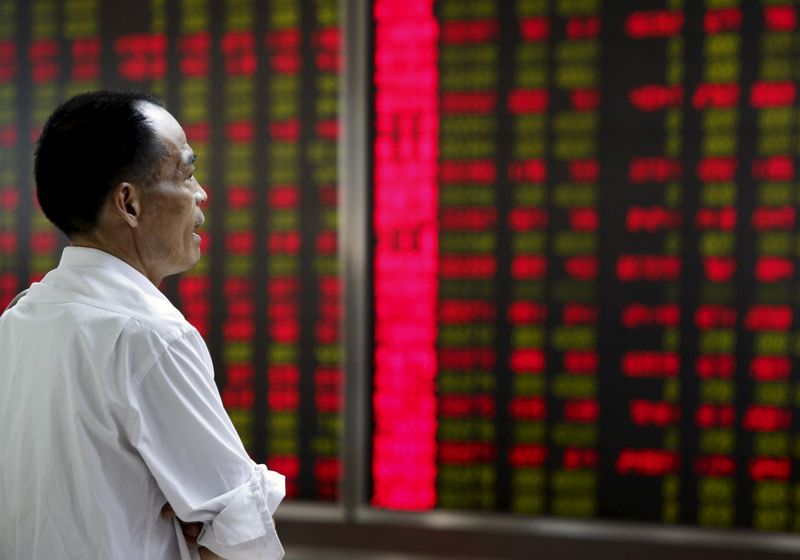By Nathaniel Taplin and Pete Sweeney
SHANGHAI (Reuters) - China's markets regulator has frozen a trading account linked to Citadel Securities, a unit of the U.S. group that also owns hedge fund Citadel LLC, as Beijing battles against speculators to prop up China's ailing stock markets.
The regulator, which has declared war on "malicious" short selling, has been at the forefront of a government-orchestrated campaign to prevent a meltdown in the two main stock markets, which have tumbled some 30 percent since mid-June.
The Shanghai (SSEC) and Shenzhen (SZSC) markets fell again on Monday, undermined by fresh concerns over the health of the world's second-largest economy.
Factory activity shrank more than initially estimated in July, contracting by the most in two years as new orders fell and dashing hopes that the economy may be steadying, a private survey showed on Monday.
On Saturday, a local newspaper carried some bearish comments from a central bank official who expected downward pressure would persist in the second half of the year.
The weak economic backdrop has magnified the challenge Beijing faces in trying to restore investor confidence in shares despite a massive month-long, state-driven buying campaign.
Beijing last week also turned its focus on automated trading strategies, suspecting some hedge fund strategies deliberately or accidentally distorted pricing in search of quick profits.
The Citadel statement did not say why the Shenzhen-based trading account had been suspended, but a source familiar with the matter said the China Securities Regulatory Commission (CSRC) was looking at its role in causing market volatility, in particular the number of its cancelled transactions.
The CSRC did not immediately respond to a request for comment.
"Citadel has been actively investing in the region for 15 years, and has always maintained a constructive dialogue with regulators, including during the recent market volatility," Citadel said in a statement.
The statement said the suspended account belonged to Citadel Shanghai Trading, an onshore unit of Citadel Securities, and was managed by China's Guosen Futures Ltd. Citadel Shanghai's other accounts were operating normally. "We continue to comply with all local laws and regulations," Citadel said.
It was the first time in the current crackdown that a foreign firm had revealed that one of its Chinese accounts had been suspended.
FOREIGN FIRMS IN THE CROSSHAIRS
Citadel is not the only foreign institution that has been working in China, and some industry insiders think other foreign fund management companies, in particular hedge funds employing quantitative strategies, could be in regulators' crosshairs.
"A lot of the quant' shops overseas have been really aggressive in setting up short positions," said one fund management executive at a foreign investment advisory in Shanghai who spoke on condition of anonymity.
"I think these are at risk, I definitely do," he added.
The Shanghai and Shenzhen exchanges have so far frozen 38 trading accounts for trading irregularities, including the account affiliated with Citadel. The total also includes another four cited by Shanghai on Monday for serious irregularities that influenced market pricing. It did not name the four accounts.
Beijing's unconvincing efforts to hold up markets have led foreign investors to air doubts about the leadership's ability to ensure financial stability at a time of slowing economic growth, high corporate debt and the threat of deflation.
They have also raised questions over the ruling Communist Party's commitment to free-market reforms, seen as essential for China to pull off its planned transition from an export-led economy to one based on consumption and services.
The crackdown on short-sellers and automated trading strategies is also extending into overseas jurisdictions.
The CSRC is pressing foreign and Chinese-owned brokerages in Hong Kong and Singapore to hand over trading records to identify those with net short positions, sources said.
The broader Shanghai and Shenzhen markets fell 1.1 percent and 2.7 percent respectively on Monday, though they are both still up over the year so far. Between January and June, Shanghai jumped 60 percent and Shenzhen more than doubled.
The CSI300 index (CSI300) of the largest listed companies in Shanghai and Shenzhen actually ended up 0.33 percent on Monday. Many of its stocks have been the main focus of the official stock-buying campaign.
